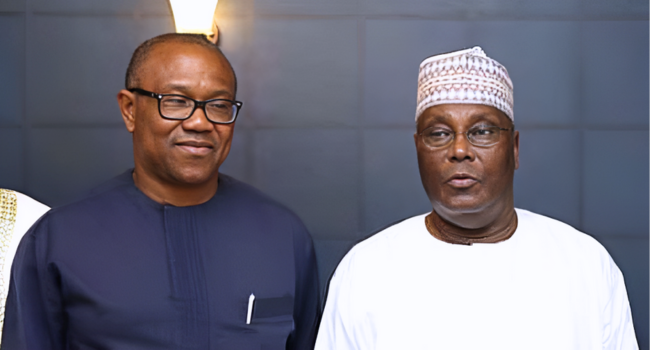Adebayo Adenrele
A Senior Advocate of Nigeria (SAN), Robert Clarke, has said the lawyers of Atiku Abubakar and Peter Obi did not demonstrate professionalism in challenging President Bola Tinubu’s victory in the 2023 election.
Clarke’s comment came hours after the Supreme Court upheld the victory of Tinubu in the February 25 presidential election.
“I am not saying they (Atiku, Obi’s lawyers) fumbled the case; what I am saying is that they have not displayed a good sense of legal practice,” the legal luminary said on Thursday’s edition of Channels Television’s Politics Today.
NEWSTODAYNG recalled that the Apex court in its ruling, dismissed the appeals by Atiku Obi over claims of fraud, electoral law violations, and Tinubu’s ineligibility to run for president.
The apex court thrashed all the grounds of appeal of Atiku and the PDP on qualification, non-compliance with the Electoral Act, the 25% votes in FCT, and electoral malpractices.
Commenting on the ruling of the apex court, Clarke said there was a lack of due diligence in the appeals, pointing out that the legal representation of Atiku and Obi could have been better.
The senior lawyer said he would not even permit a junior member of his chamber to bring such a brief before the Supreme Court.
“Where the law is not allowed to put its heads up in a proceeding, it means that there is another law which prohibits their lawyers to have brought such. They know it, they still decided — either to please their supporters and allow such a matter to come before the Supreme Court.
“I will not allow any junior in my chambers, even one or two years old to carry such a brief to go and argue in court when I have looked into all the facts and the facts are very clear. There is a limitation of time in election matters. You cannot do certain things.
“They had the opportunity as a pre-election matter but they never brought it out. They had the opportunity as a matter within a tribunal’s case but they never brought it. They are now coming and bringing matters that should have been argued in the lower tribunal and the Supreme Court will now be reviewing such evidence as an appellate matter and not as an original jurisdictional matter.
“I am not blaming the lawyers; that is the last thing I would do, but I am sorry to say that the lawyers, with due respect to them, should have done a better job in this regard.
“As the Supreme Court said, if you have facts that were available before the trial started and you did not bring them into the trial court.
“Therefore, if you intend to use any evidence in the Supreme Court, you must have ensured that such evidence must have passed through the original jurisdiction of the lower court,” he said.

